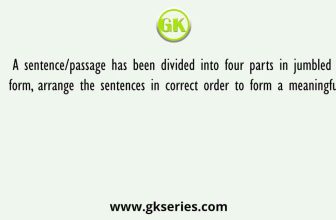
Directions: Read the given passage carefully and answer the questions that follow. It is gratifying to note that the Supreme Court, while indicating its intention to reconsider the sedition provision in the Indian Penal Code, has raised the question most relevant to the issue:
“Why does Section 124 A continue in the statute book even after 75 years of independence?” Chief Justice N. V. Ramana has also pointed to the rampant misuse of the section by the police across the country, and reminded the government that it was a legal provision that the colonial regime had used to suppress the freedom movement. The issues flagged by the Chief Justice of India may set the tone for what would be a comprehensive reconsideration of a section that has been frequently and wrongfully used, especially in the last few years, to suppress dissent, criminalize strident political criticism and taint opponents with the tag of being ‘anti-national’. Even though it is often argued that the misuse of a law alone does not render it invalid, there is a special case to strike down Section 124 A because of its inherent potential for misuse. There is a pattern of behaviour among all regimes that indicate a proclivity to invoke it without examining its applicability to the facts of any case. Recent cases show that sedition is used for three political reasons: to suppress criticism and protests against particular policies and projects of the government, to criminalise dissenting opinion from human rights defenders, lawyers, activists and journalists, and to settle political scores, sometimes with communal hues.
It is not to be forgotten that the section was
upheld in 1962 by a Constitution Bench mainly by reading down the import of the terms “bring into hatred or contempt”, or “to create disaffection towards the government established by law” and limit its scope to only those instances of speech or writing that show a pernicious tendency to create public disorder.
Without this attenuated interpretation, the restriction imposed on free speech by Section 124A would have been declared unconstitutional. The court is now seized of several cases that seek a reconsideration of the 1962 verdict, citing more recent judgments expanding the scope of fundamental rights and doctrines that have been subsequently evolved. In particular, the “chilling effect” that a law may have on free speech and the vague and ‘overbroad’ definition of sedition that renders both provocative and innocuous speeches or writings equally liable for prosecution are points to be examined. In 2016, the government itself admitted in Parliament that the definition of sedition is too wide and requires reconsideration. The Law Commission also released a consultation paper in 2018 saidthat“In a democracy, singing from the same songbook is not a benchmark of patriotism. People should be at liberty to show their affection towards their country in their own way.” While issuing fresh guidelines and safeguards is one wayof quelling the potential for its misuse, it will be more helpful if Section 124 A is struck down altogether.
1) Why does the Supreme Court intend to reconsider the Indian Penal Code’s sedition provision?
A. Because the section is too old and stringent and needs to be improved.
B. Because there has been widespread misuse of the section by police officers across the country
C. Because the section is no longer applicable in contemporary times.
D. Because the section restricts people’s freedom of expression.
E. None of the above
Sol:
In the given passage, it is mentioned that “It is gratifying to note that the Supreme Court, while indicating its intention to reconsider the sedition provision in the Indian Penal Code, has raised the question most relevant to the issue: “Why does Section 124 A continue in the statute book even after 75 years of independence?” Chief Justice N. V. Ramana has also pointed to the rampant misuse of the section by the police across the country”.
From the above lines, we can infer that option B is the correct answer.
2) Recent cases show that sedition is used for which of the following reasons?
I. to suppress criticism and protests against specific government policies and projects.
II. to bolster popular discontent against political leaders
III. to criminalize opposing opinions from human rights defenders, lawyers, etc.
IV. to put an end to political feuds and community squabbles.
A. Only I
B. Only IV
C. Both I and III
D. Both II and III
E. All the above
In the given passage, it is mentioned that
“Recent cases show that sedition is used for three political reasons: to suppress criticism and protests against particular policies and projects of the government, to criminalize dissenting opinion from human rights defenders, lawyers, activists and journalists, and to settle political scores, sometimes with communal hues.”
Therefore, option C is the correct answer.
3) Which of the following is/are FALSE with respect to the given passage?
A. Section 124 A was enshrined in law in 1962 by a Constitution Bench.
B. In 2016, the government admitted in Parliament that the definition of sedition is too wide and requires reconsideration.
C. The Supreme Court has ruled in favour of upholding Section 124 A.
D. In recent years, the law of sedition has been abused to silence critics.
E. None of these
Sol:
In the given passage, we can see that the supreme court raises a question asking “Why does Section 124A continue in the statute book even after 75 years of independence?” and Chief Justice N. V. Ramana has also pointed to the rampant misuse of the section by the police across the country”.
From these lines, we can understand that the Supreme court is not in favour of upholding section 124a. Therefore, option C is the correct answer.
4) In the given sentence, “The Law Commission also released a consultation paper in 2018 that In a democracy, singing from the same songbook is not a benchmark of patriotism”, what is the meaning of the highlighted phrase?
A. To have the same understanding of something as someone else.
B. Bring an illicit activity to an end by informing on (the person responsible).
C. To criticize (someone) for doing something
D. To chastise loudly, or to issue a severe warning
E. None of these
The meaning of the phrase ‘singing from the same songbook’ is ‘to say the same things
about a subject in order to give the impression of unity or agreement’. Thus, the given
sentence means that expressing the same
opinions as others in a group is not a measure
of patriotism in a democracy.
Therefore, option A is the correct answer.
5) What is the SYNONYM of the word ‘attenuate’ used in the passage?
A. Reinforced
B. Enervated
C. Bolstered
D. Consolidated
E. Fortifying
The meaning of the word ‘attenuated’ is ‘having been reduced in force, effect, or value’ and the meaning of the word ‘enervated’ is ‘make (someone) feel drained of energy or vitality’.
Therefore, option B is the correct answer.
6) What is the ANTONYM of the word ‘quelling’ as used in the passage?
A. Pacify
B. Negotiate
C. Mollify
D. Subdue
E. Trigger
The meaning of the word ‘quell’ is ‘put an end to (a rebellion or other disorder), typically by the use of force’ and the meaning of the word ‘trigger’ is ‘cause (an event or situation) to happen or exist’.
Therefore, option E is the correct answer.




